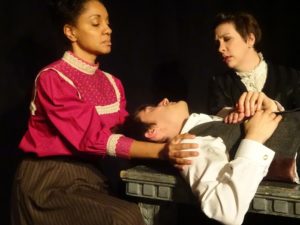“Is art to be an actor’s emotional masturbation on stage?”
Local director and UVic Theatre instructor Clayton Jevne asks that question because he knows there is an inevitable disconnect between the spontaneous emotional human experience we have in our day-to-day lives and the one actors have on stage. One of his intentions is to narrow that gap with the play Neva, which is centred around Bloody Sunday in 1905, when unarmed protestors were shot by Russian soldiers. The characters—who play actors in the show—help a fellow performer, Olga, come to terms with the death of her spouse through improvisational performance art. But Jevne doesn’t use traditional method acting, because he says that can get confusing for the artist and dilutes the character, pointing specifically to Olga’s experience in the play.

“She is so confused about whether the feelings she portrays on stage are her feelings or whether they’re feelings that she’s pretending to play because she’s an actor,” says Jevne. “She hopes to be able to isolate the authentic emotions she has from the counterfeit emotions that she is accustomed to creating for the stage.”
This is also a belief that holds true personally for Jevne, who is a 1978 graduate of the “ancient” Theatre program at Camosun. Losing touch of the line between your own motivations and the character’s is one of the reasons Jevne steers clear of method acting.
“If you are manifesting physically and vocally and intentionally what the character’s representing [you’ll] use your own capacity as an emotional human being to—and I hate the word ‘channel’—but basically channel the character’s intentions emotionally through the words that the playwright has written,” says Jevne.
The actors use their own authentic emotions when they do that, he says, adding that over the years, method acting has proven itself to be “a really misguided effort” because it robs the character of their own personality and motives, as well as the richness of the playwright’s words.
Instead of method acting, Jevne uses a three-step process when he directs that every human being goes through many times daily, he says, using feelings, intentions, and behaviours. But this process, he says, is sort of tacitly forbidden in the theatre world.
“Behavioural scientists have identified that every time we utter a phrase or think a phrase, those three things are in play,” he says, “so that’s something that’s based on psychological research.”
There’s a spontaneous aspect to Jevne’s style of direction that mimics everyday life; that spontaneity and clarity is what replaces method acting. For Jevne, spontaneity is a big part of what sets theatre apart from real life: the actors have memorized what they’re going to say, and if some of that spontaneity can be restored by going through a similar psychological process on stage and off, he says, theatre can be a transcendent experience that no other art form can capture.
“It’s an experience that I would pay almost any amount of money to have,” he says. “You come out of theatre feeling aware of your complete potential as a human being because you haven’t had to put up any barriers or walls to protect yourself, which we would in real life. You’re totally aware of that feeling that is unhindered by any kind of worry that you might be vulnerable. It’s like being completely vulnerable, with no worries about being completely vulnerable.”
Neva
Until Saturday, March 3
Various prices (February 20 is admission by donation)
Theatre Inconnu
theatreinconnu.com
